Contents
Market Overview
Macro Review
Declining U.S. inflation caused front-end Treasury yields to fall. CPI inflation coming in at its lowest level since April 2021, and core services excluding rents which rose just 0.1%, led the market to price-in a June pause. The WSJ termed this as a “summer vacation” for the Federal Reserve. The second theme was around the U.S. debt ceiling. Treasury bill yields were more stable over the week, even if the political narrative became more tense. The case study of 1979 is relevant when Treasury missed T-Bill maturity payments but cured these within 20 days. There are two nuances to U.S. sovereign debt, which do not apply to any other jurisdiction or sovereign. U.S. Treasuries do not cross-default and do not pay post-default interest (PDI). The comparison to 2011 is a bit more apt as it did culminate in S&P downgrading the country, but U.S. Treasuries aggressively rallied in the aftermath and proved to be “credit worthy”. Even if Moody’s or Fitch removed the U.S. AAA rating, there ought to still be a flight-to-quality and U.S. 1-year CDS at a record high of 177bps will ultimately decline sharply. The theme across EM was similar on disinflationary trends. China’s weaker inflation offered several key takeaways: (1) the inflation release highlighted that manufacturing demand declined 4.7%; (2) consumer tourism spending also declined, despite the narrative of pent-up demand; (3) food inflation fell, but poultry +6.7% and pork +4.0% inflation was steady; and (4) PPI was notably weak and down 3.6%. These four features validated the contraction in manufacturing PMIs reported in the past two weeks and contributed to declining non-deliverable swap yields falling. The Peoples Bank of China is now increasingly likely to cut deposit rates, but the timing remains uncertain. The next significant development is Turkish elections. The last Turkish poll (KONDA) favored Kilicdaroglu by 49.3% to Erdogan’s 43.7%, which came just after Ince had pulled out of the Presidential race. As one of the more closely fought EM elections in the past decade, the developments next week will be important for risk sentiment.
EM Credit Update
Emerging market sovereign credit (cash bonds) ended the week up 0.4% with spreads unchanged. Sovereign outperformers were Sri Lanka, Tajikistan and Bolivia, while Zambia, Pakistan and Ukraine underperformed. Event risk has quickly resurfaced with the focus on key EM elections.
The Week Ahead
EM elections on Sunday in Turkey and Thailand are where the main event risk lies. The main Chinese data point is on whether the PBoC cuts the 1-year MLF rate from 2.75%, however we can also expect M2 money supply, industrial production and retail sales numbers. EM interest rate decisions are due out of Egypt (18.25%), Mexico (11.25%) and the Philippines (6.25%). We can also expect 1Q GDP out of Chile, Colombia and Thailand, with an inflation update out of Poland.
Highlights from emerging markets discussed below: Watershed elections in Turkey on Sunday; South Africa assets under pressure amid ongoing loadshedding and sanction risk; and Pakistan’s pending IMF disbursement still in negotiation amid political volatility.
Fixed Income
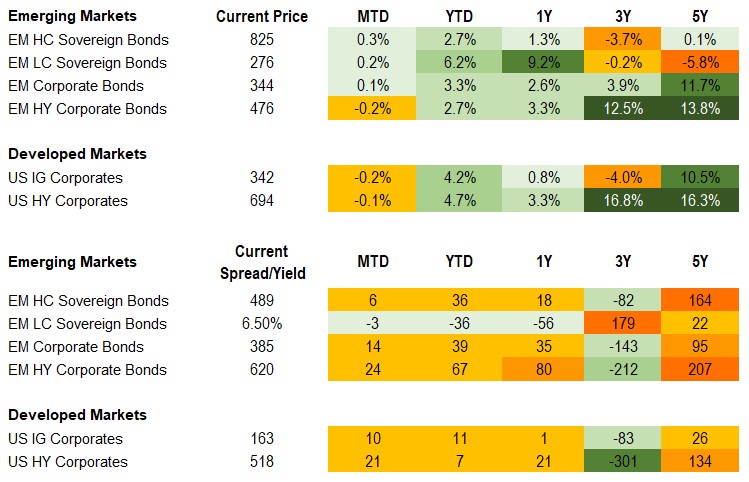
Equities
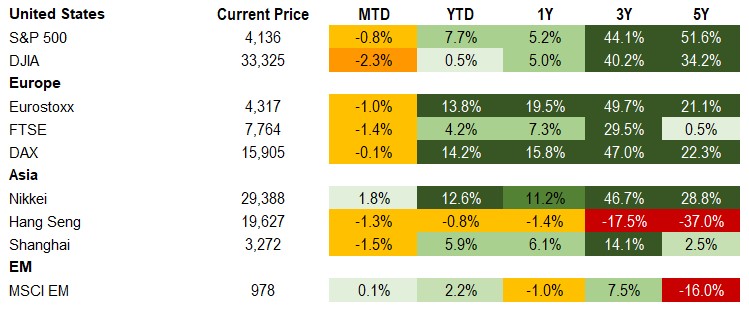
Commodities

Source for data tables: Bloomberg, JPMorgan, Gramercy. EM Fixed Income is represented by the following JPMorgan Indicies: EMBI Global, GBI-EM Global Diversified, CEMBI Broad Diversified and CEMBI Broad High Yield. DM Fixed Income is represented by the JPMorgan JULI Total Return Index and Domestic High Yield Index. Fixed Income, Equity and Commodity data is as of May 12, 2023 (mid-afternoon).
Emerging Markets Weekly Highlights
Watershed elections in Turkey on Sunday
Event: On Sunday May 14th, Turkish citizens will be voting for President and the 600-member National Assembly in an election considered by observers as the most consequential in the country’s modern history.
Gramercy commentary: Implications for both economic policy and financial markets will be profound, but are likely to vary dramatically depending upon the election outcome and the various nuances that surround it. Based on pre-election dynamics in the last few days, the “regime change” scenario has become investors’ base case. Kemal Kilicdaroglu, leader of the largest opposition party, the centrist CHP, and presidential candidate of the ideologically highly heterogenous Table of Six (ToS), appears favored to win against incumbent right-wing President Erdogan who has been in power as Prime Minister or President since 2003. We believe that if Mr. Kilicdaroglu fails to secure a victory in the first round of the Presidential Elections on Sunday, the political dynamics could again shift materially in the two weeks leading up to the potential run-off against Mr. Erdogan on May 28th. Markets will also be paying particular attention to any risk of a “fat tail” scenario in the form of contested elections in case the incumbent loses. We believe this is unlikely unless the margin of victory is extraordinarily tight, i.e., no more than 0.5% difference corresponding to ~300K votes. In case the opposition wins the presidency, we expect an initial sharp turn toward orthodox economic policy management, but one that is likely to fade over time as political constraints assert their dominance. Normalization of monetary policy via an immediate large interest rate hike by the Central Bank would be the likely first step, but regaining investor confidence on a sustainable basis would depend heavily on the willingness and ability of the new authorities to implement an aggressive reversal of Erdogan-era distortionary macroeconomic policies. In case President Erdogan is re-elected, we expect heterodox economic policy and a “high growth/high inflation model” to persist until the economy gets dangerously close to a Balance of Payments (BoP) crisis, which we believe is likely in that scenario. How long it would take until a crisis materializes would be a function of the willingness of friendly countries (Russia and GCC countries) to continue to plug Turkey’s growing external financing gap and how successful increasingly repressive micro-management of the economy will be to prevent a loss of confidence by domestic economic agents and households.
South Africa assets under pressure amid ongoing loadshedding and sanction risk
Event: The country’s power crisis worsened amid more significant loadshedding due to a mismanaged and struggling Eskom, deepening growth concerns. At the same time, the U.S. Ambassador to South Africa made claims that South Africa had supplied weapons and ammunition to Russia aiding in its fight against Ukraine. The rand depreciated roughly 4.5% on the week and 5yr CDS widened roughly 30bps.
Gramercy commentary: While we do not expect near-term resolution to the ongoing energy challenges, particularly into winter months, private sector and clean energy projects in the pipeline should help begin to alleviate pressures over the medium-term. In the meantime, growth continues to face downside risks for 2023 relative to market consensus of 0.6% and will challenge fiscal performance relative to budget assumptions. The SARB’s outsized hike of 50bps at its last meeting opens the door for a pause in the context of the more challenging growth backdrop albeit pass-through from FX weakness will offset any imminent flexibility to reduce rates. With respect to arms supplies to Russia, we see the risk of immediate sanctions as limited, but South Africa’s close ties with Russia and China will complicate diplomatic relations with the U.S. and could jeopardize renewal of AGOA (African Growth and Opportunity Act) if South African authorities do not diffuse the situation.
Pakistan’s pending IMF disbursement still in negotiation amid political volatility
Event: The IMF indicated that the 9th disbursement of Pakistan’s existing EFF program will require passage of its 2023-24 budget as well as further efforts on fuel subsidies and clarity on financing assurances. On the domestic political front, former Premier Imran Khan was arrested by the anti-graft agency triggering protests and social unrest. The Supreme Court ruled the arrest illegal and ordered his release.
Gramercy commentary: The drawn-out process over the pending IMF disbursement is a result of authorities’ mixed commitment to policy adjustment amid political divisions and volatility ahead of Presidential Elections due later this year. We think there is continued incentive for the government to retain access to financing on a bilateral and multilateral basis that ultimately allows for an IMF disbursement but we acknowledge increasingly elevated domestic political risks with growing chances for a more widespread state of emergency as the year progresses which could allow for the postponement of elections. This may open a longer window for adjustment and financing but will further extend prospects for a more structural resolution.
Emerging Markets Technicals
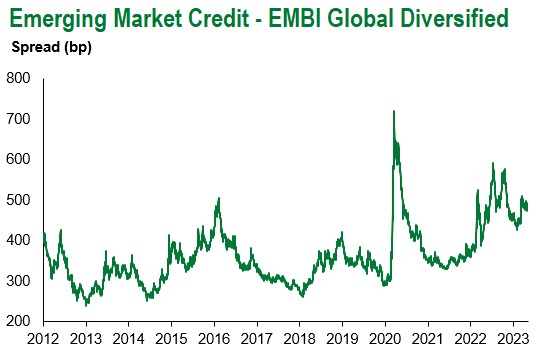
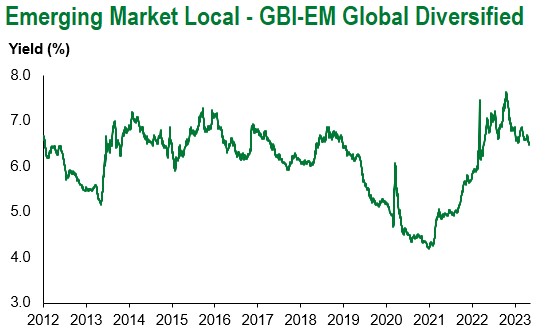
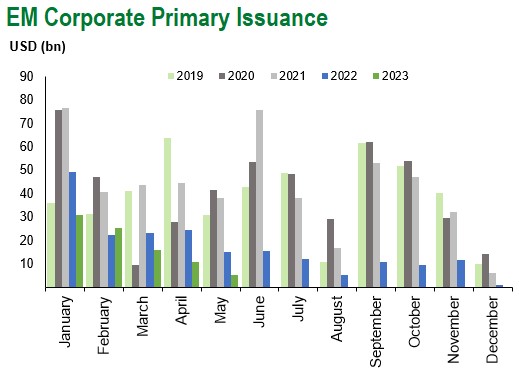
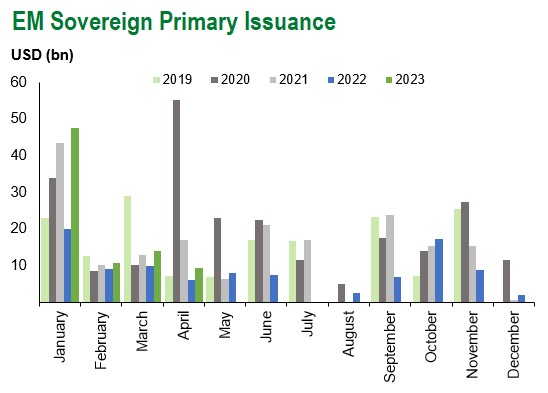
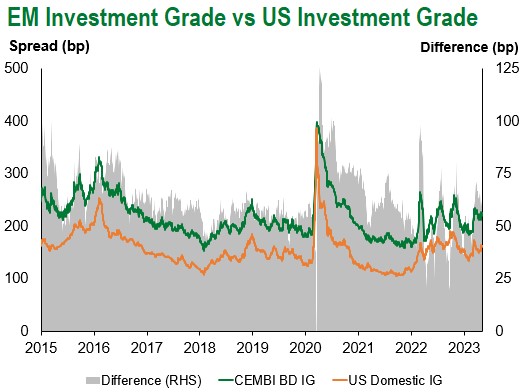
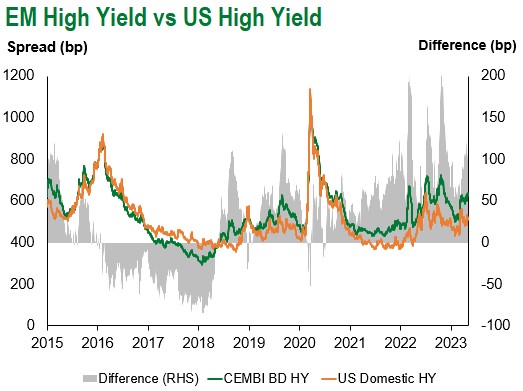
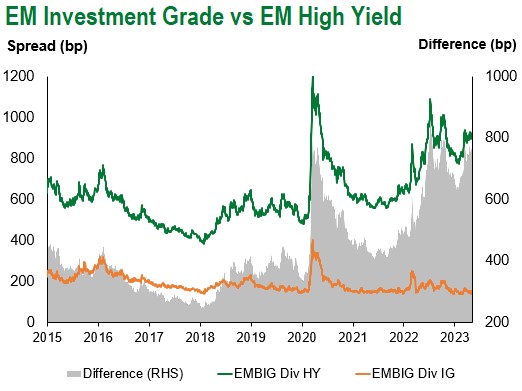
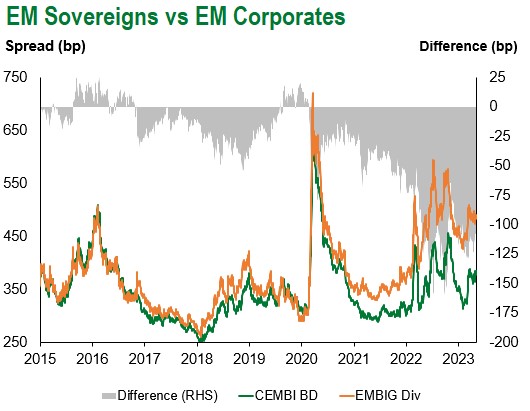
Emerging Markets Flows
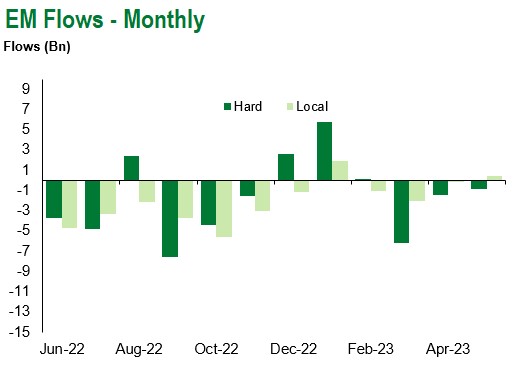
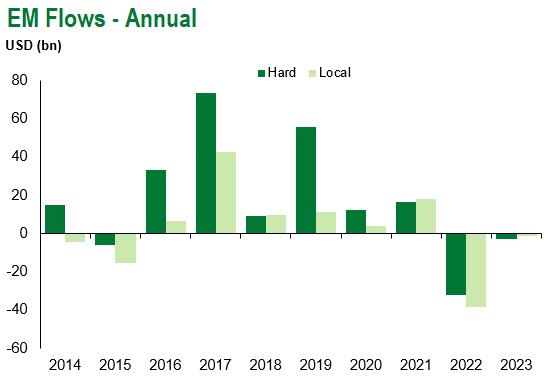
Source for graphs: Bloomberg, JPMorgan, Gramercy. As of May 12, 2023.
For questions, please contact:
Kathryn Exum, CFA ESG, Director, Co-Head of Sovereign Research, [email protected]
Petar Atanasov, Director, Co-Head of Sovereign Research, [email protected]
James Barry, Director, Deputy Portfolio Manager, [email protected]
This document is for informational purposes only. The information presented is not intended to be relied upon as a forecast, research or investment advice, and is not a recommendation, offer or solicitation to buy or sell any securities or to adopt any investment strategy. Gramercy may have current investment positions in the securities or sovereigns mentioned above. The information and opinions contained in this paper are as of the date of initial publication, derived from proprietary and nonproprietary sources deemed by Gramercy to be reliable, are not necessarily all-inclusive and are not guaranteed as to accuracy. This paper may contain “forward-looking” information that is not purely historical in nature. Such information may include, among other things, projections and forecasts. There is no guarantee that any forecasts made will come to pass. Reliance upon information in this paper is at the sole discretion of the reader. You should not rely on this presentation as the basis upon which to make an investment decision. Investment involves risk. There can be no assurance that investment objectives will be achieved. Investors must be prepared to bear the risk of a total loss of their investment. These risks are often heightened for investments in emerging/developing markets or smaller capital markets. International investing involves risks, including risks related to foreign currency, limited liquidity, less government regulation, and the possibility of substantial volatility due to adverse political, economic or other developments. References to any indices are for informational and general comparative purposes only. The performance data of various indices mentioned in this update are updated and released on a periodic basis before finalization. The performance data of various indices presented herein was current as of the date of the presentation. Please refer to data returns of the separate indices if you desire additional or updated information. Indices are unmanaged, and their performance results do not reflect the impact of fees, expenses, or taxes that may be incurred through an investment with Gramercy. Returns for indices assume dividend reinvestment. An investment cannot be made directly in an index. Accordingly, comparing results shown to those of such indices may be of limited use. The information provided herein is neither tax nor legal advice. Investors should speak to their tax professional for specific information regarding their tax situation.
